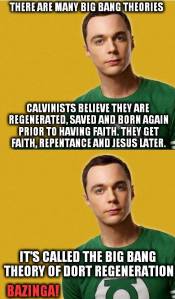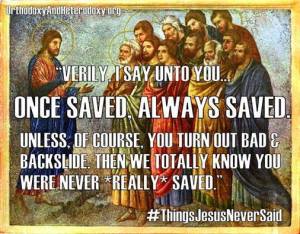 Why is it so important for Calvinists to believe in Calvinism, and that God predestined people to be elect and non-elect before they were even born?
Why is it so important for Calvinists to believe in Calvinism, and that God predestined people to be elect and non-elect before they were even born?
Do they LIKE this story and the way it turns God out to be?
Is it because Calvinism is taught in the Bible? Or is it because Calvinism COULD be taught in the Bible if we ignore certain verses and read other verses in a vacuum to make the text conform to Calvinism? MUST we read the Bible as though Calvinism is taught in it, or is it possible that we can get another outcome (more flattering to God) without having to ignore or twist any verses at all? I would of course vote for the latter. Below are the options as I see it, and the absolutely most negative aspect of Calvinism is that it makes God out to be the author of sin, turning him into a tyrant who prevents most people from being saved. Or maybe there is something even worse – namely the idea that he does this FOR HIS GLORY! The mere thought should make a Christian cringe.
The Calvinistic option
Note that I do not believe there are any Calvinists who are able to be consistent with their own doctrines, and consequently I do not believe they strictly believe what I write below. I believe they are way smarter than their own doctrines and that they more or less choose to be non-consistent Calvinists. Some try to be more consistent than others and openly admit that they believe God predestines even child molesters to commit their crimes, whereas others do all kind of gymnastics in order to avoid the absurd outcome that Calvinism demands.
- This alternative makes God responsible for our actions, including our sins. Bringing up the topic of compatibilism does not help, because we cannot make mutually exclusive ideas become true just by describing an invented process with fancy words.
- The idea is that nothing comes to pass against the will of God (at least if Westminster Confession of Faith is valid). Meaning that sin therefore (if we want to be consistent) happens according to his will. This God apparently also has at least two opposing wills, and one of his wills is attributed to his desire that get people to sin in order to accomplish his purposes.
- Since God is the author of sin, he is someone who sadly does not make sense and is therefore difficult to approach with a sincere heart. How is it possible to love someone above everything else, knowing that he has predestined most people to be wicked non-elect sinners before they were even born, and even gets so mad at them for being what he created them to be that he sends them to hell?
- Jesus did not die for everybody but only a select few, indicating that God never intended to offer salvation to all in the first place.
- A Calvinist has good reason to be boasting, considering that God chose them to be the bright wise stars in the world and not others.
- Ja. 1:13 must be ignored since it says that God does not tempt any man. Calvinists takes a step further since Calvinism teaches that God not only tempts people but makes them sin.
- Why Jesus had to die on the cross is a complete mystery is Calvinism is true. Could the elect not remain elect unless Jesus died on the cross? Did Jesus die because something went wrong? Something against God’s plans? Exactly what went wrong, and against God’s will?
- Hell is a place replete with people who have obeyed God to 100% (by being the wicked non-elect sinners that God predestined them to be.)
- The word “sovereign” is added to the Bible (in relation to KJV), which is not a problem per se, but the Calvinistic interpretation of this non-Biblical word is. By excluding the possibility that God could very well have created man with free will, this word must then by necessity mean that only God’s will could be in force on earth, leading yet again to that sin happens according to his will.
- Preaching and praying do not make any sense if Calvinism is true. The elect cannot perish, and the non-elect can never be saved. Must we do these things because God has told us to? What will then be the horrible outcome if we do not obey?
- Why all the fuss about sin, if Calvinism is true? If the idea is that nothing comes to pass against his will?
The free will option.
- This alternative makes MAN responsible for his own actions, which means that sin must be blamed on man and not on God.
- God does not want anyone to perish and there is much joy in heaven each time a person repents and can get his life restored. God’s sovereignty is not disturbed just because he chose to create man with free will and responsibility for his own actions. God does not have contradictory wills, and every single time a persons sins it is always against his will.
- Man sins according to his own will and against the will of God. This means that the God makes perfect sense when he constantly persuades people to avoid sin. God is holy and therefore disobedience separate us from him. We are created to seek him and find him (Acts. 17).
- Jesus died for everyone, showing his true love for every man. We are told to be merciful just like he is.
- We have no reason to be boasting about our salvation since we are 100% lost without God. We have no authority to forgive ourselves our own sins, but we are completely dependent on the mercy of God. He expects us to repent for our sins, and doing so is not “boasting” since all has been given this ability.
- Freewillers totally trust the Biblical information that God does not tempt any man and does NOT make people sin.
- Jesus death on the cross makes perfect sense. Something went terribly wrong and against God’s plans (sin), and there is no forgiveness without sacrificed blood. God was not surprised that Adam and Eve disobeyed him since he created them with the ability to love/hate and obey/disobey, and naturally then disobedience was a possible outcome. This is why it also makes sense that God made sure to warn Adam and Eve ahead of time about sinning, telling them that sin produces death. He told them NOT to eat, and they ate.
- Hell is a place for disobedient people who have acted against God’s commandments. They had the opportunity to be sent to heaven but due to their pride and their choice to not be followers of God, they deserve hell.
- Freewillers do not believe anything is too difficult for God, which means he is capable of creating man with free will and making man responsible for his own actions.
- Preaching and praying make perfect sense, since by doing so we can make influences on the spiritual world and the outcome of things.
Why is not the Freewill option above the better one, and the only option that saves us from having to blaspheme God by suggesting that he somehow orchestrates sin?
I have spoken to many Calvinists and I sense that most of them do not even want the Freewill option to be true because then they would have to give up Calvinism. It seems like saving Calvinism is much more important than God himself. They have all chances in the world to study on apologetic sites that could help them overcome their Calvinistic hurdles and help them to see the Bible in a different light, but they decline. They prefer to stick with their Calvinistic teachers and books, and whenever they run into a contradiction they choose to go to such sources to see if there is a solution. They would not consider going to freewill sources, since their goal is to save Calvinism. Saving the character of God from being attacked is not important? It is as though they already have their mind made up. They might ask me if they same does not apply to me – maybe I have also made up my mind beforehand? OK, but does it not make more sense to start off checking those sources that save God from being a selfish tyrant, and where there are no mutually exclusive contradictions that I have to battle?
Many Calvinists commonly ask why it would be a better alternative if God created
people knowing that there would be people denying him. It would be a better alternative since it would place the responsibility and culpability with man and not on God. Knowing something is a possibility ahead of time is not the same thing as predestining it to take place. Instead of “God made me do it”, a person must face the consequences for his own choices.
Even if it is not a perfect example, I often compare it with a Christian parent living in a secular country (much like my own) and where she/he “knows” that not all of his/her children will grow up to be believers, or even good respectful citizens, due to the agnostic/atheistic propaganda taught in school, among friends, in the media, and everywhere. Even if the Bible would be taught at home, and even if the parents would spend a lot of time encouraging their children to maintain their Christian faith, it is also close to a certainty that not all their children will make the better choice. So would the parent therefore decide to not have any children at all due to this sad reality? I have not met one person yet with this approach. Even if the parent would be told through a prophesy that not all his/her children would be saved, the parent might still decide to have children. If some of the children would turn out to be agnostics as adults, it would not be the parent’s fault. Each person must be responsible for his own actions and choices in life.
There are Calvinists who admit that there are contradictions in Calvinism, but then they often try to excuse their hopeless situation with this verse:
Is. 55:8 For my thoughts are not your thoughts, neither are your ways my ways, saith the Lord. 9 For as the heavens are higher than the earth, so are my ways higher than your ways, and my thoughts than your thoughts.
For them this verse means that even if they have no idea how to solve their theological contradictions now, they expect to do so when they get to heaven. A freewiller, however, does not have to wait until heaven before the Bible makes sense, because there are no verses which must be ignored or twisted.



 Here is another thought for Calvinists – who believe that God is micromanaging all of our steps.
Here is another thought for Calvinists – who believe that God is micromanaging all of our steps.










